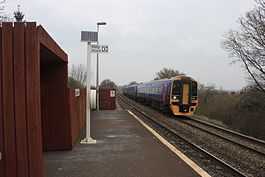Dilton Marsh railway station
| Dilton Marsh | |
|---|---|
 | |
| Location | |
| Place | Dilton Marsh |
| Local authority | Wiltshire |
| Coordinates | 51°14′56″N 2°12′28″W / 51.2490°N 2.2079°WCoordinates: 51°14′56″N 2°12′28″W / 51.2490°N 2.2079°W |
| Grid reference | ST855500 |
| Operations | |
| Station code | DMH |
| Managed by | First Great Western |
| Number of platforms | 2 |
|
Live arrivals/departures, station information and onward connections from National Rail Enquiries | |
| Annual rail passenger usage* | |
| 2002/03 | 10,484 |
| 2004/05 |
|
| 2005/06 |
|
| 2006/07 |
|
| 2007/08 |
|
| 2008/09 |
|
| 2009/10 |
|
| 2010/11 |
|
| 2011/12 |
|
| 2012/13 |
|
| 2013/14 |
|
| History | |
| Original company | Great Western Railway |
| 1937 | Opened |
| National Rail – UK railway stations | |
| * Annual estimated passenger usage based on sales of tickets in stated financial year(s) which end or originate at Dilton Marsh from Office of Rail Regulation statistics. Methodology may vary year on year. | |
| UK Railways portal | |
Dilton Marsh railway station is a railway station serving the village of Dilton Marsh in Wiltshire, England.
The station is located on the Wessex Main Line between Bristol Temple Meads and Southampton Central railway station 23 miles (37 km) north of Salisbury. First Great Western operate local services between Bristol and the South Coast which call at Dilton Marsh, the station is also operated by them.
History
The Great Western Railway opened "Dilton Marsh Halt" on 1 June 1937. The wooden platforms were 300 feet (91 m) long and were provided with small wooden shelters; the construction cost £1,134. Being a "halt" there were no staff to sell tickets, but a sign directed would-be passengers to the "7th house up the hill" where Mrs H. Roberts sold tickets from her home. She had sold tickets on a commission basis since 1947.[1]
In 1969 the station was renamed as just "Dilton Marsh." Platforms were reduced to the length of one coach. British Rail tried to shut the station but was met by strong local opposition. The remaining platforms were in very poor condition and so were rebuilt in concrete. The station reopened after an eight-week closure on 1 May 1994.[2]
Dilton Marsh Halt poem
The station was the subject of a well-loved poem "Dilton Marsh Halt" by the late British poet John Betjeman:
- Was it worth keeping the Halt open,
- We thought as we looked at the sky
- Red through the spread of the cedar-tree,
- With the evening train gone by?
- Yes, we said, for in summer the anglers use it,
- Two and sometimes three
- Will bring their catches of rods and poles and perches
- To Westbury, home for tea. '''
- There isn't a porter. The platform is made of sleepers.
- The guard of the last train puts out the light
- And high over lorries and cattle the Halt unwinking
- Waits through the Wiltshire night.
- O housewife safe in the comprehensive churning
- Of the Warminster launderette!
- O husband down at the depot with car in car-park!
- The Halt is waiting yet. ''
- And when all the horrible roads are finally done for,
- And there's no more petrol left in the world to burn,
- Here to the Halt from Salisbury and from Bristol
- Steam trains will return.
Services
Although it is a request stop, the station is quite well served. In the current timetable eight trains per day call on weekdays southbound (with an additional service on Saturdays) and eleven northbound.[3] The base frequency is every two hours each way, increasing to hourly at peak times. Destinations include Warminster, Southampton, Brighton, Bristol Temple Meads, Bath Spa and Gloucester.
On Sundays eight trains call in each direction - these are all through services on the Cardiff and Bristol to Portsmouth/Brighton route.
South West Trains services between London Waterloo and Bristol Temple Meads pass through the station, but do not stop.
| Preceding station | |
Following station | ||
|---|---|---|---|---|
| Westbury | First Great Western Wessex Main Line |
Warminster | ||
See also
References
| Wikimedia Commons has media related to Dilton Marsh railway station. |
| ||||||||||||||||||||||||||||||||||||